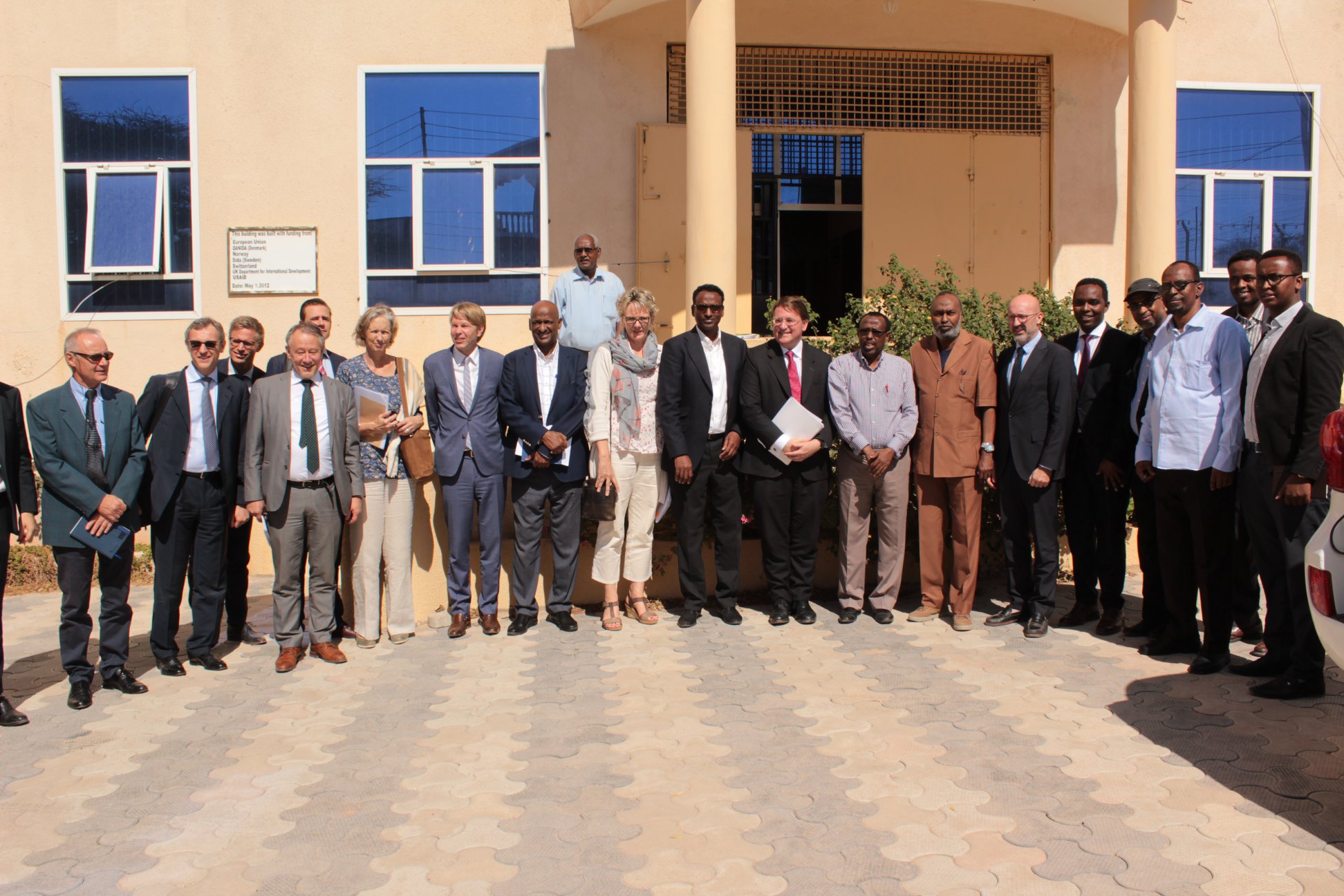

Meetings between Somaliland officials and EU delegation continue the second day in Hargeisa.
Today, April 3rd, the EU delegation met with Somaliland National
The first meeting took place at the HQ of SLNECS. The high-level Delegation from European Countries led by Head of Mission of EU, UK, DENMARK, SWEDEN, NORWAY and other Diplomates from FINLAND and SWITZERLAND.
The two sides have discussed in length the upcoming Voter Registration and combined Parliamentary and Local Council Elections and how to solve all the existing challenges.
“The EU and UK Ambassadors showed their commitment to support Somaliland Elections” SLNEC Press statement

The second meeting between the EU delegation and the Speaker of the House of Representatives, Mr. Bashe Mohamed Farah, happened in the Parliament House.
The EU diplomats discussed with the Speaker on the upcoming elections, minorities and women’s quota seats.
Parties reach no agreement:
Recently, talks between Somaliland political parties ended up with no agreement on the election issues.
Mr Hussein Ahmed Aideed of Waddani (Opposition) told the local press that “parties have what looks-like irreconcilable difference stands on the current members of the National Electoral Commission (NEC) and the composition and procedure of selection of future NEC members.”
The election of Somaliland’s lower house of parliament (Representatives) is scheduled to take place at the end of this year. But the time for the election of local governments is not set although their extended term ended this week, on March 28, 2019.
Election Challenges
The first challenge is a technical one – the National Electoral Commission (NEC) says it requires at least 10 months preparing for the elections. Not only are 82 parliamentary positions up for grabs, but also those of the local councils, if they are scheduled for the same date. So there will be much smaller and localized contests, which complicates the tasks on hand.
The second challenge is political. The main opposition party, Waddani, has refused to work with the current NEC, contributing to the delays. Waddani contested the 2017 presidential poll results but withdrew its complaints after episodes of violence. Later, Waddani rescinded their complaints for the greater good of Somaliland’s stability.
Waddani continues to disagree that the current NEC members should prepare the ground for the next election. The party argues that the NEC term is ending on November, just weeks before the election and they previously oversaw a flawed election in 2017, “so how can they be trusted to conduct a better process now? Said Hussein Aideed, who is part of Waddani’s team for election negotiations.
Waddani has proposed dismissing the current NEC, but the president and the ruling Kulmiye party have refused these demands; replacing all the commissioners as that would call into question the legitimacy of its 2017 victory, saying the NEC is competent. The third political party, UCID (For Justice and Development), has recently inclined towards Kulmiye on most of these matters.
Negotiations were continuing sluggishly, but a recent meetings to discuss these concerns was reportedly ended without a deal.

Civil society representatives, SONSAF, lamented to the local press the difficult situation in which neither side is completely right or wrong. They believe Waddani’s complaints should be heard, and that the government hasn’t done enough to move beyond the impasse. They also called on the NEC commissioners to resign for the greater good.
They cited the similar historical precedent. When Kulmiye was in opposition in the mid-2009-2010, it complained about the composition of the NEC and had it replaced, what’s so different now that Kulmiye is in power.
The last challenge is more complicating one. It is the need for a new electoral law ahead of the contest that would deal with the representation of women and minorities. There is also pressure by some regions to reallocate the division of parliamentary seats ahead of the vote.

To solve the regional seat allocation, the Center for Policy Analysis (CPA) recommended that “the President should take leadership and active role in finding out a solution for the seat allocation of the House of Representatives, and conduct inclusive and consultative process.
more recommended stories
 Somaliland to Defend Sovereignty Against Somalia’s Provocative Laascaanood Visit
Somaliland to Defend Sovereignty Against Somalia’s Provocative Laascaanood VisitThe Ministry of Foreign Affairs and.
 New Director Appointed: Burao Hospital’s Fall and the Fight for Revival
New Director Appointed: Burao Hospital’s Fall and the Fight for RevivalBurao Hospital begins a new chapter.
 Somaliland: While Mogadishu Burns, Somalia Seeks Chaos in Sool
Somaliland: While Mogadishu Burns, Somalia Seeks Chaos in SoolHargeisa, April 9, 2025 – (Somaliland.com).
 Somaliland Presidency Delivers 10 Vital Dialysis Machines to Hargeisa Group Hospital
Somaliland Presidency Delivers 10 Vital Dialysis Machines to Hargeisa Group HospitalHargeisa – Somaliland – The President.


Leave a Comment